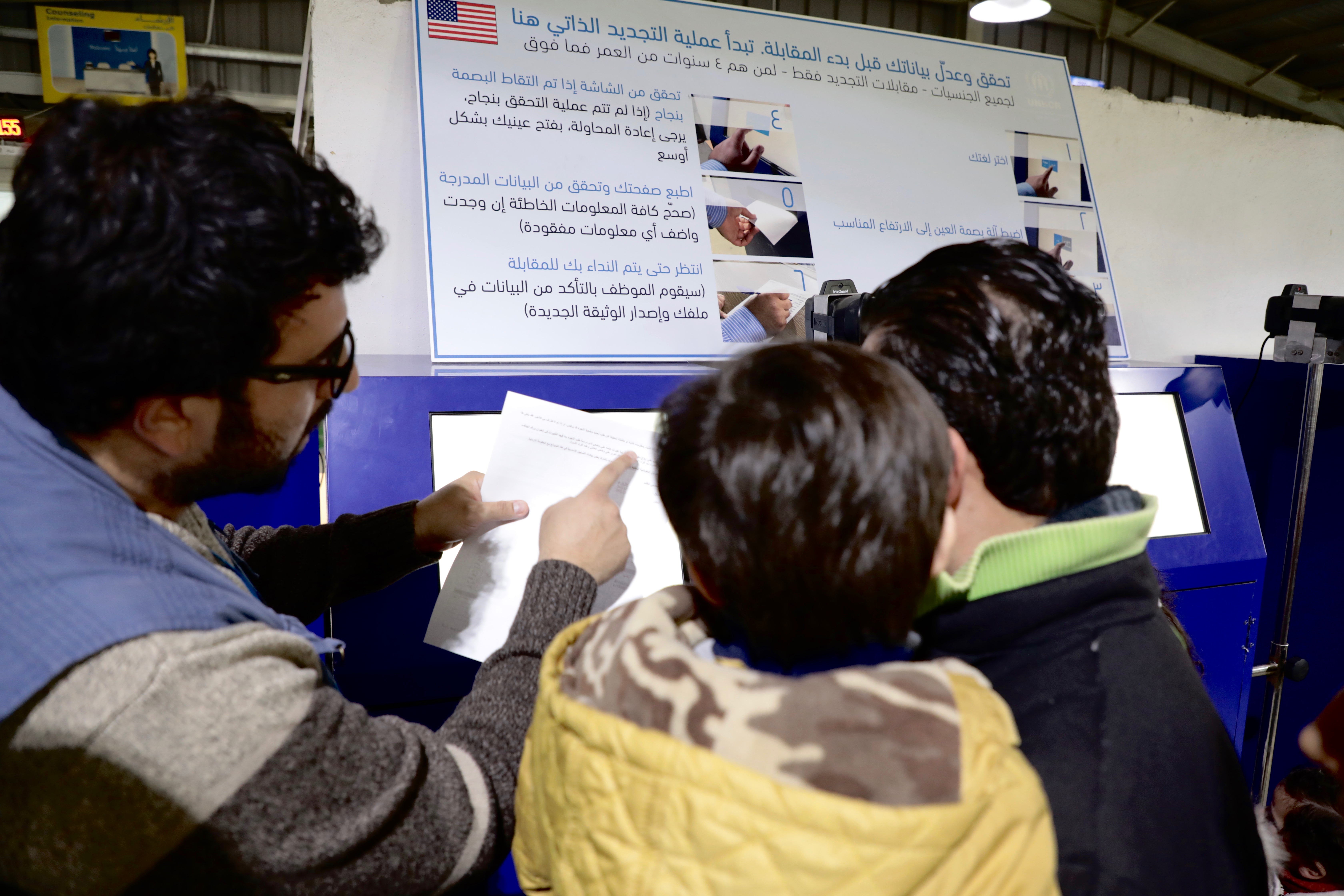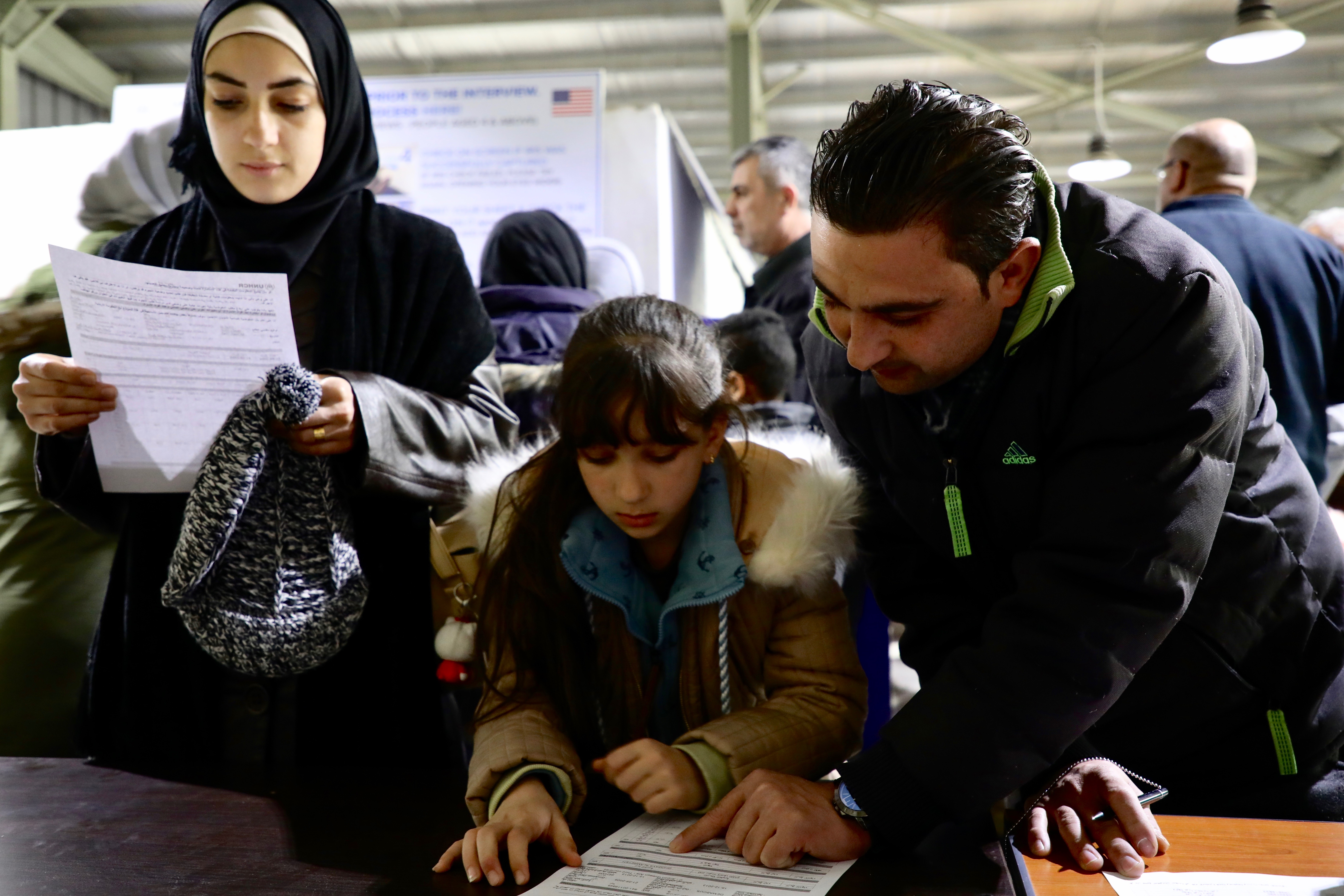In the first project of its kind, UNHCR introduces biometric self-renewal registration booths for refugees in Jordan, enabling safe and secure data ownership.
Sitting amid a crowd of some 5,000 refugees that come on a daily basis to UNHCR’s registration centre in Amman, Jordan, Syrian refugee Noor Al Deen, his wife, and two children have come to renew their asylum seeker certificate as part of the yearly Government of Jordan-required process to ensure that all their details are up to date and correct.
But this year, there is a difference. Instead of having to wait in line their turn to validate their information with UNHCR staff, now Noor Al Deen and his family can do it themselves.
The 20 biometric self-renewal registration booths set up in the registration hall are the first of their kind for UNHCR, giving refugees the ownership and authority to validate and update their data. With the six-step process clearly detailed on placards in English and Arabic, the self-renewal process has become quick and easy.
With one scan of their iris, Noor Al Deen and his family can choose to print out a pre-populated form, filled with data collected during previous interviews with UNHCR. They then check and update personal details such as their address and phone number as well as employment status. Through the use of individual biometric technology, this process authenticating refugees’ identity is highly secure, ensuring that only that specific individuals has access to his/her personal data.
After living in Jordan for five years, this updated process is much welcome for Noor Al Deen, “When you have young children having to wait for sometimes two or three hours as we have done in the past is difficult. Also just finding the time for the whole family to come and do that is a challenge, especially with my daughter at school. But now we can just come at a time that is convenient for us, check and update our information; today the validation process was very fast.”

Anas Jbarah, a UNHCR’s registration staff. talking a family through the process of self-renewal.
Talking them through the process is Anas Jbarah, one of UNHCR’s registration staff, “At the moment some of the refugees are still unsure about how to use the machines, so we’re here to help them navigate the different steps, but once you see someone use it, it’s self-explanatory and accessible for everybody.”
The self-renewal booths can even be used by children. For Noor Al Deen’s daughter, the novelty of an iris scanner still hasn’t worn off and the promise of seeing a close-up image of your eye on the screen quickly draws in crowds of children all wanting to have a go, but these self-renewal machines are far from a toy.
Registration is one of the main protection activities undertaken by UNHCR thanks to the support of key donors such as the United States of America, allowing refugees to access the documentation needed to ensure freedom of movement and access to assistance in Jordan. In addition, the regular verification of this data, now facilitated through the self-renewal machines, enables UNHCR to keep individual information accurate and up-to-date, providing the data needed for vulnerability assessments and referrals for further support.
“today the validation process was very fast”

A refugee family filling their self-renewal form at the UNHCR Registration Centre in Amman.
As the Syrian conflict enters its eighth year and individual resources continue to be depleted, for Syrian refugees in Jordan like Noor Al Deen this continued profiling based on accurate data is more important than ever. While meticulously checking his factsheet, Noor Al Deen explains, “We don’t get any cash support at the moment, it is difficult. Especially now that my children are growing up they need things which I am not able to provide. I hope based on this updated information, that this year our situation will be reviewed.”
UNHCR plans to roll-out the self-renewal biometric registration further in Jordan, establishing more booths in its network of 25-strong community support centres across the country. Through facilitating refugees to update their data remotely and giving them access to a unique, portable and authenticated digital identity, these machines are an innovative and important step forward in protecting and empowering refugees, allowing, in the long-term, their greater inclusion in financial markets and digital social security networks.
Share on Facebook Share on Twitter